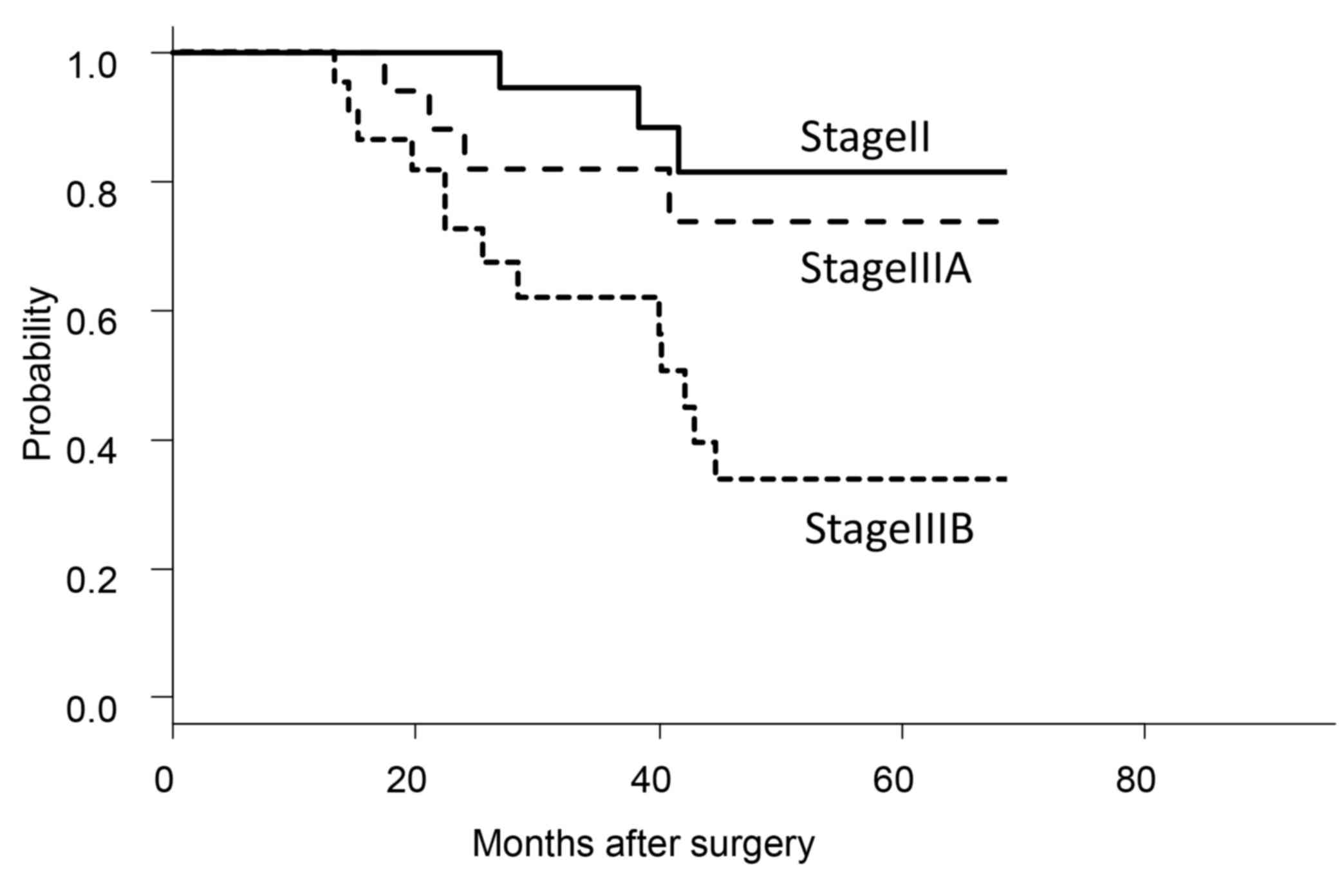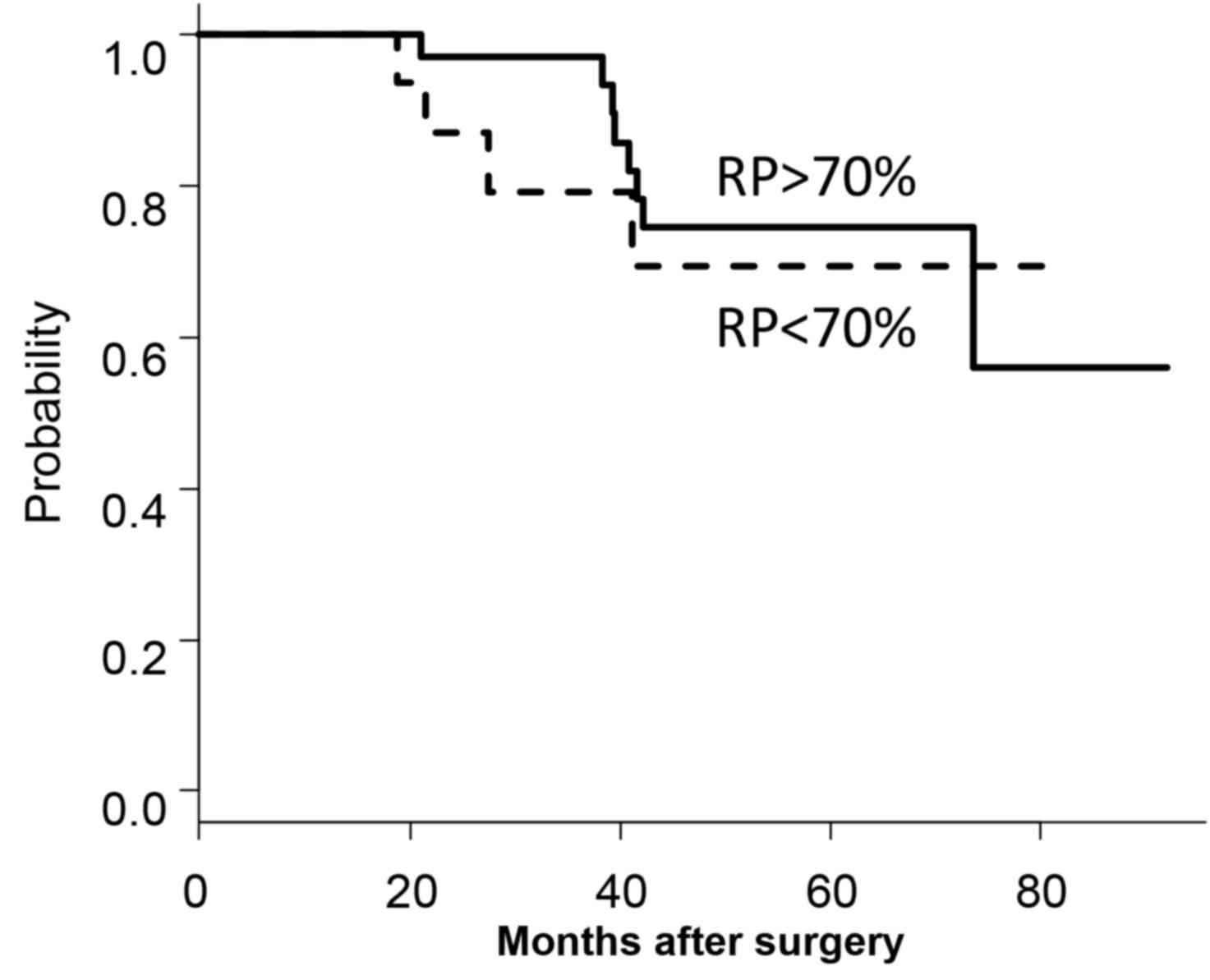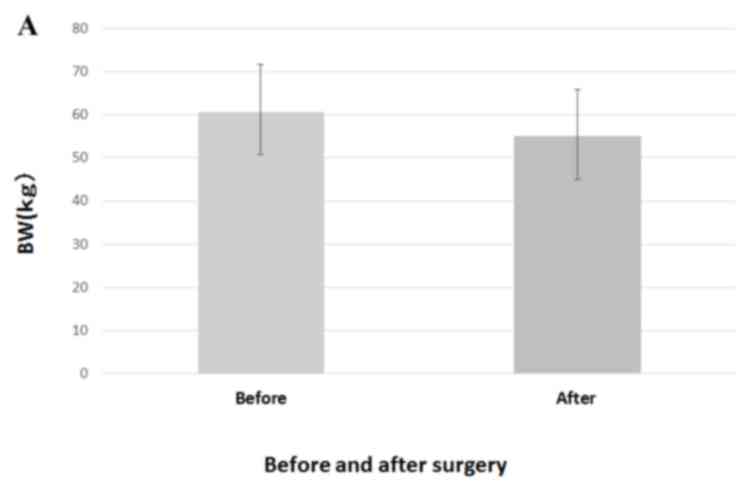|
1
|
WHO, . GLOBOSCAN 2012: Estimated cancer
incidence, mortality and prevalence worldwide in 2012 from.
http://globocan.iarc.fr/Pages/fact_sheets_cancer.aspxFebruary
6–2014
|
|
2
|
Sasako M, Sakuramoto S, Katai H, Kinoshita
T, Furukawa H, Yamaguchi T, Nashimoto A, Fujii M, Nakajima T and
Ohashi Y: Five-year outcomes of a randomized phase III trial
comparing adjuvant chemotherapy with S-1 versus surgery alone in
stage II or III gastric cancer. J Clin Oncol. 29:4387–4393. 2011.
View Article : Google Scholar : PubMed/NCBI
|
|
3
|
Sakuramoto S, Sasako M, Yamaguchi T,
Kinoshita T, Fujii M, Nashimoto A, Furukawa H, Nakajima T, Ohashi
Y, Imamura H, et al: Adjuvant chemotherapy for gastric cancer with
S-1, an oral fluoropyrimidine. N Engl J Med. 357:1810–1820. 2007.
View Article : Google Scholar : PubMed/NCBI
|
|
4
|
Aoyama T, Yoshikawa T, Hayashi T, Kuwabara
H, Mikayama Y, Ogata T, Cho H and Tsuburaya A: Risk factors for
6-month continuation of S-1 adjuvant chemotherapy for gastric
cancer. Gastric Cancer. 16:133–139. 2013. View Article : Google Scholar : PubMed/NCBI
|
|
5
|
Aoyama T, Yoshikawa T, Shirai J, Hayashi
T, Yamada T, Tsuchida K, Hasegawa S, Cho H, Yukawa N, Oshima T, et
al: Body weight loss after surgery is an independent risk factor
for continuation of S-1 adjuvant chemotherapy for gastric cancer.
Ann Surg Oncol. 20:2000–2006. 2013. View Article : Google Scholar : PubMed/NCBI
|
|
6
|
Kawabata R, Imamura H, Kishimoto T,
Hachino Y, Yasui Y, Fujino M, Fujii C, Fukunaga M, Ohzato H and
Furukawa H: Examination of factors influencing continuity of S-1
adjuvant chemotherapy for gastric cancer patients. Gan To Kagaku
Ryoho. 39:1205–1208. 2012.PubMed/NCBI
|
|
7
|
Kim SJ, Kim YJ, Kim JH, Park DJ, Kim HH,
Lee JS and Lee KW: Safety, compliance, and predictive parameters
for dosage modification in adjuvant S-1 chemotherapy for gastric
cancer. Cancer Sci. 104:116–123. 2013. View Article : Google Scholar : PubMed/NCBI
|
|
8
|
Lien YC, Hsieh CC, Wu YC, Hsu HS, Hsu WH,
Wang LS, Huang MH and Huang BS: Preoperative serum albumin level is
a prognostic indicator for adenocarcinoma of the gastric cardia. J
Gastrointest Surg. 8:1041–1048. 2004. View Article : Google Scholar : PubMed/NCBI
|
|
9
|
Liu H, Deng J, Zhang R, Hao X, Jiao X and
Liang H: The RML of lymph node metastasis was superior to the LODDS
for evaluating the prognosis of gastric cancer. Int J Surg.
11:419–424. 2013. View Article : Google Scholar : PubMed/NCBI
|
|
10
|
Migita K, Takayama T, Saeki K, Matsumoto
S, Wakatsuki K, Enomoto K, Tanaka T, Ito M, Kurumatani N and
Nakajima Y: The prognostic nutritional index predicts long-term
outcomes of gastric cancer patients independent of tumor stage. Ann
Surg Oncol. 20:2647–2654. 2013. View Article : Google Scholar : PubMed/NCBI
|
|
11
|
Sakurai K, Ohira M, Tamura T, Toyokawa T,
Amano R, Kubo N, Tanaka H, Muguruma K, Yashiro M, Maeda K and
Hirakawa K: Predictive potential of preoperative nutritional status
in long-term outcome projections for patients with gastric cancer.
Ann Surg Oncol. 23:525–533. 2016. View Article : Google Scholar : PubMed/NCBI
|
|
12
|
Ema A, Yamashita K, Sakuramoto S, Wang G,
Mieno H, Nemoto M, Shibata T, Katada N, Kikuchi S and Watanabe M:
Lymph node ratio is a critical prognostic predictor in gastric
cancer treated with S-1 chemotherapy. Gastric Cancer. 17:67–75.
2014. View Article : Google Scholar : PubMed/NCBI
|
|
13
|
Pattison S, Mann GB, Crosthwaite G, Lade
S, Mitchell C, Leong T, Busuttil RA and Boussioutas A: Predictors
of outcome after surgery for gastric cancer in a Western cohort.
ANZ J Surg. 86:469–474. 2016. View Article : Google Scholar : PubMed/NCBI
|
|
14
|
Maruyama K: The most important prognostic
factors for gastric cancer patients: A study using univariate and
multivariate analysis. Scandinavian J Gastroenterol. 22:63–68.
1987. View Article : Google Scholar
|
|
15
|
Kim JP, Lee JH, Kim SJ, Yu HJ and Yang HK:
Clinicopathological characteristics and prognostic factors in 10
783 patients with gastric cancer. Gastric Cancer. 1:125–133. 1998.
View Article : Google Scholar : PubMed/NCBI
|
|
16
|
Nozoe T, Ninomiya M, Maeda T, Matsukuma A,
Nakashima H and Ezaki T: Prognostic nutritional index: A tool to
predict the biological aggressiveness of gastric carcinoma. Surg
Today. 40:440–443. 2010. View Article : Google Scholar : PubMed/NCBI
|
|
17
|
Watanabe M, Iwatsuki M, Iwagami S,
Ishimoto T, Baba Y and Baba H: Prognostic nutritional index
predicts outcomes of gastrectomy in the elderly. World J Surg.
36:1632–1639. 2012. View Article : Google Scholar : PubMed/NCBI
|
|
18
|
Kodera Y, Sasako M, Yamamoto S, Sano T,
Nashimoto A and Kurita A; Gastric Cancer Surgery Study Group of
Japan Clinical Oncology Group, : Identification of risk factors for
the development of complications following extended and
superextended lymphadenectomies for gastric cancer. Br J Surg.
92:1103–1109. 2005. View
Article : Google Scholar : PubMed/NCBI
|
|
19
|
Gretschel S, Christoph F, Bembenek A,
Estevez-Schwarz L, Schneider U and Schlag PM: Body mass index does
not affect systematic D2 lymph node dissection and postoperative
morbidity in gastric cancer patients. Ann Surg Oncol. 10:363–368.
2003. View Article : Google Scholar : PubMed/NCBI
|
|
20
|
Barry JD, Blackshaw GR, Edwards P, Lewis
WG, Murphy P, Hodzovic I, Thompson IW and Allison MC: Western body
mass indices need not compromise outcomes after modified D2
gastrectomy for carcinoma. Gastric Cancer. 6:80–85. 2003.PubMed/NCBI
|
|
21
|
Inagawa S, Adachi S, Oda T, Kawamoto T,
Koike N and Fukao K: Effect of fat volume on postoperative
complications and survival rate after D2 dissection for gastric
cancer. Gastric Cancer. 3:141–144. 2000. View Article : Google Scholar : PubMed/NCBI
|
|
22
|
Lee JH, Paik YH, Lee JS, Ryu KW, Kim CG,
Park SR, Kim YW, Kook MC, Nam BH and Bae JM: Abdominal shape of
gastric cancer patients influences short-term surgical outcomes.
Ann Surg Oncol. 14:1288–1294. 2007. View Article : Google Scholar : PubMed/NCBI
|
|
23
|
Kodera Y, Ito S, Yamamura Y, Mochizuki Y,
Fujiwara M, Hibi K, Ito K, Akiyama S and Nakao A: Obesity and
outcome of distal gastrectomy with D2 lymphadenectomy for
carcinoma. Hepatogastroenterology. 51:1225–1228. 2004.PubMed/NCBI
|
|
24
|
Dhar DK, Kubota H, Tachibana M, Kotoh T,
Tabara H, Masunaga R, Kohno H and Nagasue N: Body mass index
determines the success of lymph node dissection and predicts the
outcome of gastric carcinoma patients. Oncology. 59:18–23. 2000.
View Article : Google Scholar : PubMed/NCBI
|
|
25
|
Murphy PM, Blackshaw GR, Paris HJ, Edwards
P, Barry JD and Lewis WG: Prospective evaluation of nutritional
status related to body mass indices and outcomes after modified D2
gastrectomy for carcinoma. Clin Nutr. 23:477–483. 2004. View Article : Google Scholar : PubMed/NCBI
|
|
26
|
Tokunaga M, Hiki N, Fukunaga T, Ohyama S,
Yamaguchi T and Nakajima T: Better 5-year survival rate following
curative gastrectomy in overweight patients. Ann Surg Oncol.
16:3245–3251. 2009. View Article : Google Scholar : PubMed/NCBI
|
|
27
|
Nozoe T, Kohno M, Iguchi T, Mori E, Maeda
T, Matsukuma A and Ezaki T: Analysis of the impact of the body mass
index in patients with gastric carcinoma. Surg Today. 42:945–949.
2012. View Article : Google Scholar : PubMed/NCBI
|
|
28
|
Moriwaki Y, Kunisaki C, Kobayashi S,
Harada H, Imai S and Kasaoka C: Does body mass index (BMI)
influence morbidity and long-term survival in gastric cancer
patients after gastrectomy? Hepatogastroenterology. 50:284–288.
2003.PubMed/NCBI
|
|
29
|
Dignam JJ, Polite BN, Yothers G, Raich P,
Colangelo L, O'Connell MJ and Wolmark N: Body mass index and
outcomes in patients who receive adjuvant chemotherapy for colon
cancer. J Natl Cancer Inst. 98:1647–1654. 2006. View Article : Google Scholar : PubMed/NCBI
|
|
30
|
Japanese Gastric Cancer Association, .
Japanese classification of gastric carcinoma. 13th. Kanehara,
Tokyo, Japan: 1999
|
|
31
|
Sobin LH, Gospodarowics MK and Wittekind
CH: TNM classification of malignant tumours. 7th. John Wiley &
Sons; New York: 2009
|
|
32
|
Lauren P: The two histologic main types of
gastric carcinoma: Diffuse and so-called intestinal-type carcinoma.
An attempt at a Histo-Clinical classification. Acta Parhol Microbid
Scan. 64:31–49. 1965. View Article : Google Scholar
|
|
33
|
Common terminology criteria for adverse
events v3.0 (CTCAE). http://ctep.cancer.gov/protocolDevelopment/electronic_applications/docs/ctcaev3.pdfJournal.
August 9–2006.
|
|
34
|
Cockcroft DW and Gault MH: Prediction of
creatinine clearance from serum creatinine. Nephron. 16:31–41.
1976. View Article : Google Scholar : PubMed/NCBI
|
|
35
|
Onodera T, Goseki N and Kosaki G:
Prognostic nutritional index in gastrointestinal surgery of
malnourished cancer patients. Nihon Geka Gakkai Zasshi.
85:1001–1005. 1984.(In Japanese). PubMed/NCBI
|
|
36
|
survivalROC: Time-dependent ROC curve
estimation from censored survival data. Journal. May
6–2016https://cran.r-project.org/web/packages/survivalROC/index.html
|
|
37
|
WHO Expert Consultation, . Appropriate
body-mass index for Asian populations and its implications for
policy and intervention strategies. Lancet. 363:157–163. 2004.
View Article : Google Scholar : PubMed/NCBI
|
|
38
|
Kiyama T, Mizutani T, Okuda T, Fujita I,
Tokunaga A, Tajiri T and Barbul A: Postoperative changes in body
composition after gastrectomy. J Gastrointest Surg. 9:313–319.
2005. View Article : Google Scholar : PubMed/NCBI
|
|
39
|
Hirao M, Takiguchi S, Imamura H, Yamamoto
K, Kurokawa Y, Fujita J, Kobayashi K, Kimura Y, Mori M and Doki Y;
Osaka University Clinical Research Group for Gastroenterological
Study, : Comparison of Billroth I and Roux-en-Y reconstruction
after distal gastrectomy for gastric cancer: One-year postoperative
effects assessed by a multi-institutional RCT. Ann Surg Oncol.
20:1591–1597. 2013. View Article : Google Scholar : PubMed/NCBI
|
|
40
|
Hiki N: Body weight loss in cancer
patients: Mechanism of body weight loss by treatment. The Japanese
Journal of Clinical Nutrition. 120:848–851. 2012.(In Japanese).
|
|
41
|
Andreyev HJ, Norman AR, Oates J and
Cunningham D: Why do patients with weight loss have a worse outcome
when undergoing chemotherapy for gastrointestinal malignancies? Eur
J Cancer. 34:503–509. 1998. View Article : Google Scholar : PubMed/NCBI
|
|
42
|
Ock CY, Oh DY, Lee J, Kim TY, Lee KH, Han
SW, Im SA, Kim TY and Bang YJ: Weight loss at the first month of
palliative chemotherapy predicts survival outcomes in patients with
advanced gastric cancer. Gastric Cancer. 19:597–606. 2016.
View Article : Google Scholar : PubMed/NCBI
|
|
43
|
Sinicrope FA, Foster NR, Sargent DJ,
O'Connell MJ and Rankin C: Obesity is an independent prognostic
variable in colon cancer survivors. Clin Cancer Res. 16:1884–1893.
2010. View Article : Google Scholar : PubMed/NCBI
|
|
44
|
Dawood S, Broglio K, Gonzalez-Angulo AM,
Kau SW, Islam R, Hortobagyi GN and Cristofanilli M: Prognostic
value of body mass index in locally advanced breast cancer. Clin
Cancer Res. 14:1718–1725. 2008. View Article : Google Scholar : PubMed/NCBI
|
|
45
|
Nozoe T, Kohno M, Iguchi T, Mori E, Maeda
T, Matsukuma A and Ezaki T: The prognostic nutritional index can be
a prognostic indicator in colorectal carcinoma. Surg Today.
42:532–535. 2012. View Article : Google Scholar : PubMed/NCBI
|

















